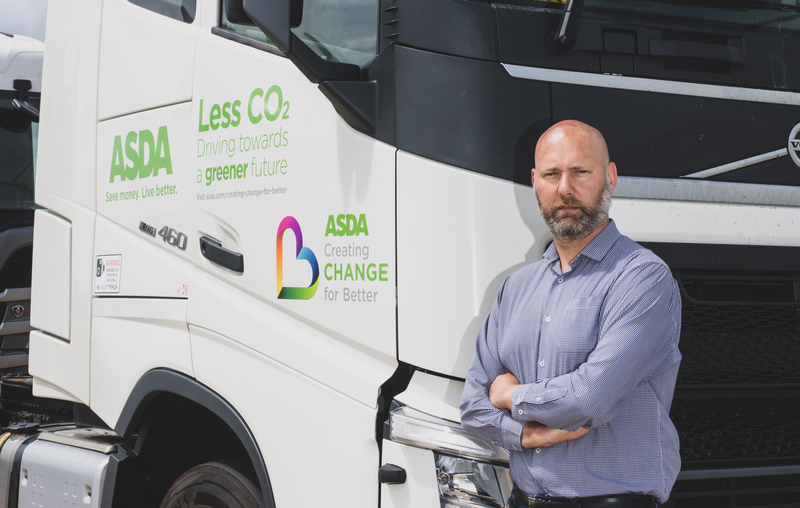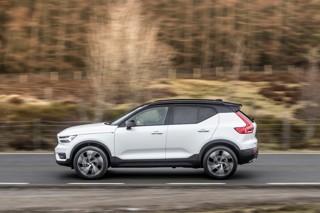Efficiency is the watchword at Asda Stores Ltd, under the banner of ‘fewer, friendlier, cheaper miles’, as the supermarket chain moves to a centralised planning structure, trials alternative fuel options and focuses on boosting utilisation and efficiency levels.
Huge gains have come from a proactive preventative maintenance programme which, aligned to strong third-party relationships and simply “doing the basics well”, has helped to more than halve Asda’s vehicle off-road (VOR) percentage to less than 5% across its 3,100-strong van fleet.
The business separates its leasing and maintenance contracts, using Hitachi Capital Vehicle Solutions for funding and Mercedes-Benz, Ford and Iveco for contract-backed repair and maintenance services. With Zenith co-ordinating the overall aftersales services across the majority of the fleet, this gives the best value and performance, with suppliers who can focus their concentration on meeting Asda’s needs.
Chris Hall (above), Asda Logistics Services (ALS) senior director – central logistics, explains: “It’s one thing providing the funding for the vehicle across its life but it’s another having the right skill set to maintain it. We’ve found that you don’t necessarily get the best deal if you try to do a one-stop shop.”
The key-partner approach results in a competitive leasing rate and the controls and processes to ensure fewer breakdowns and faster repairs. Asda points to Zenith’s software and data analysis which facilitate preventative maintenance, complemented by its solutions for reactive maintenance.
“It’s a different skill set to a transactional leasing offer,” Hall adds. “We’ve not found anyone that can provide both really well.”
ALS also runs a fleet of almost 1,000 tractor units and more than 3,000 trailers, of which a third are temperature-controlled. Premium brands Scania and Volvo, Asda’s long-time partners, maintain the trucks via their dealer networks.
Efficiency is the watchword at Asda Stores Ltd, under the banner of ‘fewer, friendlier, cheaper miles’, as the supermarket chain moves to a centralised planning structure, trials alternative fuel options and focuses on boosting utilisation and efficiency levels.
Huge gains have come from a proactive preventative maintenance programme which, aligned to strong third-party relationships and simply “doing the basics well”, has helped to more than halve Asda’s vehicle off-road (VOR) percentage to less than 5% across its 3,100-strong van fleet.
The business separates its leasing and maintenance contracts, using Hitachi Capital Vehicle Solutions for funding and Mercedes-Benz, Ford and Iveco for contract-backed repair and maintenance services. With Zenith co-ordinating the overall aftersales services across the majority of the fleet, this gives the best value and performance, with suppliers who can focus their concentration on meeting Asda’s needs.
Right skill set
Chris Hall (above), Asda Logistics Services (ALS) senior director – central logistics, explains: “It’s one thing providing the funding for the vehicle across its life but it’s another having the right skill set to maintain it. We’ve found that you don’t necessarily get the best deal if you try to do a one-stop shop.”
The key-partner approach results in a competitive leasing rate and the controls and processes to ensure fewer breakdowns and faster repairs. Asda points to Zenith’s software and data analysis which facilitate preventative maintenance, complemented by its solutions for reactive maintenance.
“It’s a different skill set to a transactional leasing offer,” Hall adds. “We’ve not found anyone that can provide both really well.”
ALS also runs a fleet of almost 1,000 tractor units and more than 3,000 trailers, of which a third are temperature-controlled. Premium brands Scania and Volvo, Asda’s long-time partners, maintain the trucks via their dealer networks.
The location of their sites closely mirrors Asda’s distribution centres, offering an end-to-end fleet solution.
“Maintaining 1,000 tractors and 3,000 trailers across 24 depots with logistics and distribution managers at those sites is much easier than trying to manage 3,100 vans spread across 300 stores where the skill sets and training are diverse – it’s a very different dynamic”
Chris Hall, ALS senior director – central logistics
Buying the right trucks
For ALS’s logistics fleet, improvements in the VOR performance continue. Buying the right trucks, supported by Scania and Volvo, has been key. Success has also been underpinned by the use of health check software, which monitors brakes, tyres and axle weights. The data enables the company to be more proactive in tackling potential issues.
“We don’t differentiate between the fleets. The vans are maintained to the same standards as the O-Licenced truck fleet and we stringently adhere to the same programme for both,” Hall says.
“The challenge, of course, is we have our systems, the shops have their own systems, Zenith has its systems and the garage networks have systems, and they are not necessarily integrated. That’s a problem for the industry, not just our problem. There’s an opportunity going forward to join the dots across all this data.”
Over the past decade, Asda has taken strides towards implementing a national, centralised planning programme designed to boost efficiency and utilisation of its operations, which makes 17,000 deliveries a week to a network of almost 650 shops. The process started with a move from localised planning, where each depot had its own transport plan, to regional which gave an immediate improvement in efficiency and fleet utilisation.
Hall draws on the example of Yorkshire, where Asda has two ambient depots and a chilled depot. Their activities now sit on one plan with an open window agreement with the retail shops, enabling the fleet to use every hour of the day.
“Up until about five years ago, we had very specific one-hour delivery windows for every load. This wasn’t optimal,” Hall says. “We now have a much larger delivery window, so we are able to maximise efficiencies in our day-to-day planning.”
As fresh deliveries are typically made through the night and ambient during the day, the regional plan enables the transfer of vehicles between sites to eliminate surplus capacity. Overall utilisation and mileage of the fleet is now much higher with each vehicle travelling approximately 500,000 miles over its four-year lifecycle. That sits against a backdrop of network alignment, bringing depots closer to stores, which has seen Asda’s average stem miles (distance to/from depot to store) reduce to less than 90 miles. A decade ago, it was 110-115 miles.
“These are short shunts now, not long journeys of 12-13 hours a day travelling to one customer. Typically, our drivers now do two or three journeys in a day”
Chris Hall, ALS senior director – central logistics
Same volume, fewer loads
This initiative has been supported by the introduction of double-deck trailers which deliver the same volume with fewer loads and, therefore, fewer miles.
“This is all part of our strategy of ‘fewer, friendlier, cheaper miles’,” Hall adds. “That’s our mantra – drive down the amount of deliveries and then make the ones we do more efficient.”
The next step, to be delivered later this year, will see Asda go from eight regional planning sites to one national planning hub in the Midlands.
“That will be where we plan transport routing and scheduling for 17,000 deliveries a week, all of the inter-trunk movement between the sites and all of the collections of our parcel deliveries,” Hall says.
“Standardising and centralising has been a key theme for us. This move will be a major piece of change.”
A key benefit of a national structure is the ability to integrate primary and secondary logistics planning. At present, each of the eight regional offices schedule their own depot-to-store deliveries with six third-party providers doing their own planning, resulting in 14 plans. Managed centrally, this will become one consolidated plan.
One outcome will be a reduction in empty running. Almost half of truck deliveries return to base with reverse logistics, such as pallets, cages, general waste and recycling but this still means 50% of Asda’s 17,000 weekly journeys are coming back empty. And the same is true for its primary partners.
Hall wants to sew the two networks together and use the collective leverage of the ALS fleet and the third-party fleet.
“I see a future where we have more of our primary inbound hauliers taking shop deliveries out for us after they have delivered into our depots; but also some of our own fleet delivering primary inbound off the back of shops,” he says. “We do some of this now, but because they are on different plans, it’s disconnected. That’s where we see the biggest opportunity for efficiencies.”
Sustainability is a core Asda value – it’s first target was launched in 2005 with its initial carbon footprint report published six years later – and the fleet has an important part to play in ensuring the company achieves its goal of halving its greenhouse gases by 2025.
Latest diesel technology has improved efficiencies, but Asda is now embarking on an “aggressive change” from diesel to gas. More than half of the 1,000 tractors units will be run on liquefied natural gas (LNG) by the end of next year, with a complete switch expected during 2024.
“The tractor units are more expensive, but the overall fuel saving is significant. And the sustainability agenda is important for the business,” says Hall.
Asda has 312 gas trucks producing 80% fewer emissions than the diesel equivalents. They are forecast to save the company close to £1 million this year.
“It’s not insignificant, even though it’s still relatively new technology. The reliability is good (a key factor in Asda’s full-life cost calculations), the drivers like them – which is always important – and they are saving money,” Hall says.
Fuelling infrastructure
The main challenge, albeit more at an industry level, is the lack of LNG fuelling infrastructure, although Asda is investing in its own gas filling stations.
For trucks, Hall believes gas is the most obvious stepping-stone to electric. His ex-colleagues at WalMart (Asda’s former parent) in America are reporting successful trials on electric trucks, but he doesn’t expect to see viable models in the UK for the next few years.
“We have also looked at hydrogen, but it doesn’t appear to have a business case that stacks up – at the moment, the only game in town if you want to come away from diesel is gas,” Hall adds.
“I think it’s diesel to gas, gas to electric – probably within the next 10 years - and then, a slightly different turn, electric to autonomous – but I’ll probably be retired by then!”
Chris Hall, ALS senior director – central logistics
Quicker progress will be made on electric vans, although just a handful of manufacturers currently offer the right options for Asda’s Online business. There are also infrastructure considerations here, although ALS is already looking at installing charge points at some depots to accommodate fridge trailers, rather than run them on red diesel.
“Doing this across the best part of 300 sites becomes a huge undertaking to get that infrastructure right,” Hall says.
“But we’ve got to start somewhere, and I see the next six-12 months being about proof of concept, does it stack up and what are the unintended consequences of what we are doing – we’ll do all of that. But if it’s as successful as gas on heavy fleet then we will get the backing to spend the cash.”
Hall has been part of the Asda logistics team for 23 years, joining the business as a transport manager. During that time, he has retained fleet within his job description and is now responsible for specification, procurement and maintenance of the vans and trucks, planning and forecasting volumes across the network, and the transport operating model, including the structure and processes both centrally and in the depots.
“Fleet follows you around as a career – you become the subject matter expert for transport, although in the past five years the role has widened significantly,” he says.
‘Collect’ service
His broad remit also includes managing the global imports operation, contract management of Asda’s nine recycling centres, distribution of fuel to its filling stations and the ‘collect’ service – a commercial offering to suppliers to transport their goods from point of manufacture to the depot network. It’s another revenue stream.
“We are the middleman between our depots and our supply team so, when it comes to volume forecasting and activity planning, we do all of that within our team and cascade the key forecasts out to the depots,” Hall says.
“In the past couple of years, we have started to rent out any spare capacity we have in our warehouses with our own suppliers or organisations that have nothing to do with our business – we have 70,000 pallet spaces that are being rented out – which gives us profitable revenue.”
Like many of its counterparts, Asda has seen a huge surge in demand for online shopping during the Covid pandemic. Consequently, its fleet of 3.5-tonne home delivery vans is set for rapid expansion this year, from 3,100 to 3,500 and potentially reaching 3,800 by the end of 2022.
When Hall brought responsibility for the vans into his team seven years ago, the van fleet numbered just 1,400. However, while he procures the vans, the day-to-operations and profit and loss are the responsibility of the online grocery team.
Rapid fleet growth and the employment of new drivers reinforces the need for robust safety and risk management processes.
Every driver is given a range of training, with the annual Certificate of Professional Competence (CPC) used for truck drivers. ALS is extending the use of its hand-held personal digital assistants (PDAs) to include vehicle checks as it assesses ways in which technology can improve compliance.
Telematics in vans and trucks measures driving behaviour, complemented by cameras, but it’s almost a full-time job to monitor every incident and near miss, particularly with a heavy fleet travelling
50 million miles a year and a van fleet 30 million, often in riskier built-up areas.
“We have a level of visibility we’ve never had before which is good for us to be able to investigate incidents,” Hall says.
“We’re able to identify where we might have high risk drivers and take pre-emptive action, while we also work with Logistics UK on fleet and process audits.”
Together with the national planning project, greater utilisation and introduction of alternatives fuels, Asda’s risk policy is another pillar to ensure the fleet achieves the goal of fewer, friendlier, cheaper miles.

Hall on... vehicle lead times ‘most challenging’
Global production shutdowns caused by the Covid pandemic and the emerging semiconductor supply shortage is putting pressure on organisations acrossthe industry.
For Asda Stores Ltd, the challenge is how to manage the situation against a backdrop of rapid growth in its home delivery fleet.
“It’s probably the most challenging I’ve seen in the 30 years I’ve been in logistics,” says Chris Hall. “Whether it’s 3.5-tonne vans, 7.5-tonne trucks or 44-tonne artics, the lead time for fleet has gone out massively.”
Innovation more difficult
That lack of consistent predictability makes innovating more difficult, delaying plans for proofs of concept on electric vans.
“The pipeline of supply has dried up with the production shutdowns, and it’s hand-to-mouth. But that’s manageable,” Hall adds.
“What will tip things over the edge is the semiconductor issue. That’s a real risk to us”
Chris Hall, ALS senior director – central logistics
Typically, the lead time for both vans and trucks is 12-20 weeks; those times have now doubled. While ASL attempted to offset the problem by securing capital approval for vehicle replacements earlier in the year, it is now considering placing orders for vehicles scheduled to arrive at the back end of 2022, this year.
“I don’t see this problem going away any time soon,” Hall says.
A more diverse team ‘gets you better results’
 Diversity and inclusivity are “massively important” to Asda, according to Chris Hall. The company is a sponsor at the Amazon Everywoman Transport & Logistics Awards* and puts huge emphasis on having wide representation within its teams.
Diversity and inclusivity are “massively important” to Asda, according to Chris Hall. The company is a sponsor at the Amazon Everywoman Transport & Logistics Awards* and puts huge emphasis on having wide representation within its teams.
“Fleet for many years has had a reputation for being middle-aged men, but the reality is we do have a good level of diversity within the team,” says Hall. “It’s not as high as I would like it but across the function, we are seeing a significant increase in diversity, around age and gender.”
He adds: “We get different perspectives by having people from different backgrounds working together and that’s important because every day we come across a new challenge, and the ability to get to the right, well rounded answer depends on the people around you. Having a more diverse team gets you better results.”
Three of his eight reports are female which was “unheard of” 10 years ago. Involvement in the Everywoman Awards has raised Asda’s profile and helped to bring more people from diverse backgrounds into logistics.
“There has been a corporate push to ensure that everything around diversity of thought is enacted within the teams,” Hall adds.
“Whenever we are recruiting, the best person should get the job, but we need to pick from a wider pool around gender, ethnicity and all our inclusion values. We are doing a better job of that.”
* Asda sponsors the Industry Champion Award at the 2021 Amazon Everywoman in Transport & Logistics Awards. For more information and to find out this year’s winners.
Login to continue reading.
This article is premium content. To view, please register for free or sign in to read it.























Login to comment
Comments
No comments have been made yet.